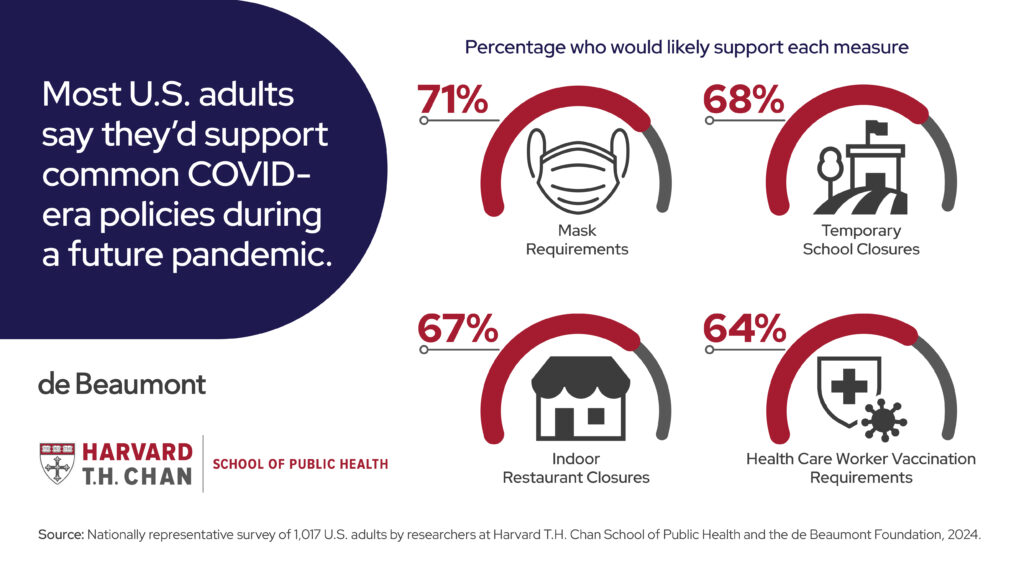A new U.S. survey suggests that most Americans would back certain COVID-like containment measures if another pandemic were to emerge, even though many also fear economic fallout and political influence on public health decisions.
Researchers at the Harvard T.H. Chan School of Public Health and the de Beaumont Foundation studied the views of 1,017 adults across the country. Their findings appear in the current issue of Health Affairs Scholar.
The survey looked at support for four potential pandemic strategies: mask requirements, temporary school closures, indoor restaurant closures, and mandatory vaccinations for health care workers. According to the study, 71 per cent of respondents said they would be likely to support mask requirements, 68 per cent would support temporary school closures, 67 per cent would support closing indoor restaurants, and 64 per cent would support vaccination requirements for health care workers.
Overall, 81 per cent of those polled said they would back at least one of the four strategies, while almost half of respondents—49 per cent—said they would endorse all four. These findings come as the United States continues to face infectious disease outbreaks, prompting debate about how employers and public health leaders can balance business considerations with future health measures.
“This research shows that public health leaders have an opportunity to build pandemic policies that resonate with Americans,” said Gillian K. SteelFisher, PhD, MSc, director of the Harvard Opinion Research Program and lead author of the study. “But it will be important to do so with empathy, transparency, and awareness of the disruptions they can cause to people’s daily lives and livelihoods.”
Mixed reactions among varied demographics
The study revealed differences in policy support based on factors such as age, income level, geographic location, and political affiliation. Women, younger adults, individuals with lower incomes, and those living in urban areas tended to be more open to the four proposed measures. Many respondents who considered themselves at high risk for serious illness from COVID-19 were also more willing to accept stricter pandemic guidelines.
Black and Hispanic/Latino participants, as well as Democrats and Independents, showed stronger support across all four strategies than white participants and Republicans. Still, the researchers noted that majorities of every demographic subgroup surveyed—such as Republicans (64 per cent) and those in rural areas (72 per cent)—supported at least one of the four measures.
Employers and HR managers may find this breakdown useful as they consider policies to keep workplaces safe without alienating staff. Many organizations are expected to focus on measures that affect high-risk individuals first, or to adopt policies for limited timeframes.
Concerns about the economy and politics
The study also highlights major concerns about the potential costs of such measures. About four in five respondents worried that future pandemic policies might harm the economy, serve political interests, cater to business interests, widen social divides, or pander to critics.
According to the survey, 83 per cent of respondents believed future measures could damage the economy, while 83 per cent felt political motives might drive decisions. Another 82 per cent worried about businesses influencing pandemic rules, and 81 per cent thought policies might be shaped by those looking to soothe critics or extremist voices.
HR professionals and C-suite leaders may view these concerns as signs that any future restrictions—such as shutting down certain services or requiring masks—could spark backlash from employees or the public. The data indicate a growing wariness about the motives behind health-related mandates, whether they come from government agencies or private employers.
Personal choice and tailored policies
Many respondents said they were most comfortable with rules that specifically target higher-risk groups for a limited period, while still allowing people to make personal decisions. This aligns with the survey’s conclusion that pandemic strategies focusing on personal choice and clear timeframes are more likely to gain public acceptance.
“As public health leaders revisit their approaches to pandemic preparedness, they should take heart that existing tools are still broadly supported—despite loud and sometimes high-profile voices to the contrary,” said Brian C. Castrucci, DrPH, president and CEO of the de Beaumont Foundation. “Balancing safety with economic and social needs will be crucial for navigating future health crises.”
For executives tasked with maintaining stable business operations, these findings could guide decisions about potential new workplace policies, such as mask requirements or vaccination clinics on site. Being transparent about why and how measures will be enforced—and for how long—may improve buy-in among staff.

Communication and community engagement
The authors emphasized that clear communication and community involvement are important in developing and carrying out pandemic policies. People want to understand how rules are made and who they are intended to protect. In many cases, lack of understanding and mistrust of decision-makers can fuel resistance to guidelines.
While the study focused on American attitudes, Canadian employers may also note the potential implications. With the ease of cross-border travel and shared economic interests, Canadian businesses and public health leaders often track U.S. trends when planning their own response to global health challenges. The authors said clarity about economic impacts and respect for personal freedoms could help build trust and cooperation, even during the most restrictive phases of a new pandemic.
Many large employers in the United States struggled to manage costs and workforce morale amid the prolonged disruptions caused by COVID-19 lockdowns. HR departments pivoted to remote work policies, while executives weighed the risks of adopting mandatory vaccination policies. The fact that a broad portion of the U.S. public remains open to some of these strategies may offer a measure of confidence to leaders who are still unsure how to prepare for any future disease outbreaks.
Lessons for the future
According to the study’s authors, the key to success will lie in developing clear guidelines that meet public health objectives while also addressing economic and social concerns. Their research suggests public health leaders, political officials, and business decision-makers should focus on three main points when building support for future pandemic measures:
- Transparency about timeframes: Setting clear start and end dates helps workers, families, and businesses plan ahead.
- Targeting high-risk groups: Concentrating efforts on individuals most at risk of severe illness or death can limit the impact on the broader population.
- Respecting individual choices: Emphasizing personal freedoms within guidelines can make policies easier to accept.
While some people may remain sceptical of policy decisions, the high levels of general support suggest that many Americans will consider a range of options to contain a virus if it threatens public health. For employers, these findings point to the importance of balancing mandated requirements with flexible strategies that allow employees and customers to protect themselves.
The full article was published in Health Affairs Scholar by researchers at Harvard T.H. Chan School of Public Health and the de Beaumont Foundation. The study polled a representative sample of 1,017 U.S. adults, offering insights into how health measures may be received if another large-scale health threat emerges.





